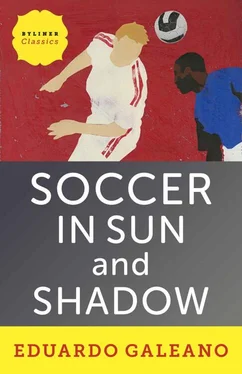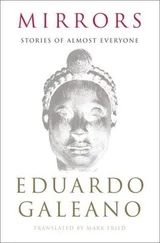But the body sat up. Once he had served his cocaine sentence, Maradona became the fireman of the Argentine squad, which was burning up its last chances to reach the ’94 World Cup. Thanks to Maradona, they made it. And at the Cup once again, as in the old days, Maradona was the best of the best until the ephedrine scandal hit.
The machinery of power had sworn to get him. He spoke truth to power and you pay a price for that, a price paid in cash with no discount. And Maradona himself gave them the excuse, with his suicidal tendency to serve himself up on a platter to his many enemies and that childish irresponsibility that makes him step in every trap laid in his path.
The same reporters who harass him with their microphones, reproach him for his arrogance and his tantrums, and accuse him of talking too much. They aren’t wrong, but that’s not why they can’t forgive him: what they really do not like are the things he sometimes says. This hot-tempered little wiseacre has the habit of throwing uppercuts. In ’86 and ’94, in Mexico and the United States, he complained about the omnipotent dictatorship of television, which forced the players to work themselves to the bone at noon, roasting under the sun. And on a thousand and one other occasions, throughout the ups and downs of his career, Maradona said things that stirred up the hornet’s nest. He wasn’t the only disobedient player, but his was the voice that made the most offensive questions ring out loud and clear: Why aren’t the international standards for labor rights applied to soccer? If it’s standard practice for performers to know how much money their shows bring in, why can’t the players have access to the books of the opulent multinational of soccer? Havelange, busy with other duties, kept his mouth shut, while Joseph Blatter, a FIFA bureaucrat who never once kicked a ball but goes about in a twenty-five-foot limousine driven by a black chauffeur, had but one comment: “The last star from Argentina was Di Stéfano.”
When Maradona was finally thrown out of the ’94 World Cup, soccer lost its most strident rebel. And also a fantastic player. Maradona is uncontrollable when he speaks, but much more so when he plays. No one can predict the devilish tricks this inventor of surprises will dream up for the simple joy of throwing the computers off track, tricks he never repeats. He’s not quick, more like a short-legged bull, but he carries the ball sewn to his foot and he has eyes all over his body. His acrobatics light up the field. He can win a match with a thundering blast when his back is to the goal, or with an impossible pass from afar when he is corralled by thousands of enemy legs. And no one can stop him when he decides to dribble upfield.
In the frigid soccer of today’s world, which detests defeat and forbids all fun, that man was one of the few who proved that fantasy too can be effective.

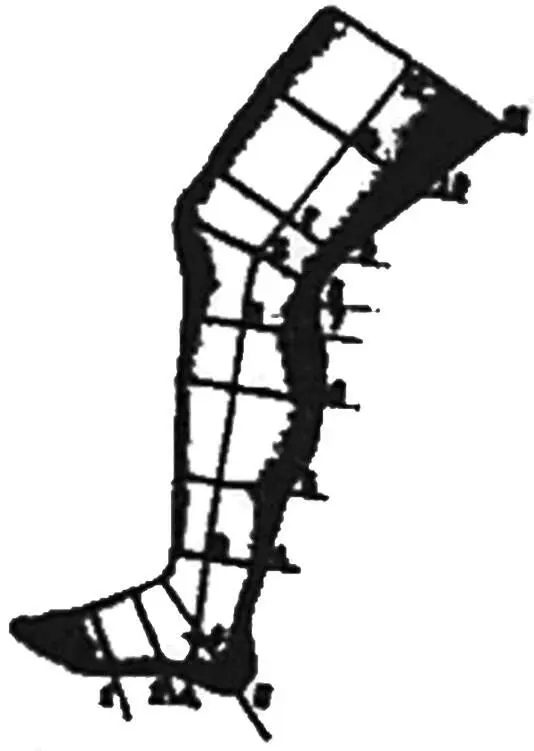
At the end of 1994, Maradona, Stoitchkov, Bebeto, Francescoli, Laudrup, Zamorano, Hugo Sánchez, and other players started organizing an international soccer players union.
Up to now the stars of the show have been blindingly absent from the structures of power where decisions are made. They have no say in the management of local soccer, and neither can they enjoy the luxury of being heard in the heights of FIFA where the global pie is divvied up.
Who are the players? Monkeys in a circus? They may dress in silk, but aren’t they still monkeys? They are never consulted when it comes to deciding when, where, and how they play. The international bureaucracy changes the rules at its whim, the players have no say. They can’t even find out how much money their legs produce, or where those fugitive fortunes end up.
After many years of strikes and demonstrations by local unions, the players have won better contracts, but the merchants of soccer continue treating them as if they were machines to be bought, sold, and loaned: “Maradona is an investment,” the president of Napoli liked to say.
Now European clubs, as well as a few Latin American ones, have psychologists on staff, as in factories. The directors do not pay them to help troubled souls, but to oil the machinery and increase productivity. Athletic productivity? Labor productivity, though in this case the hired hands are really hired feet. The fact is that professional players offer their labor power to the factories of spectacle in exchange for a wage. The price depends on performance, and the more they get paid the more they are expected to produce. Trained to win or to win, squeezed to the last calorie, they are treated worse than racehorses. Racehorses? British player Paul Gascoigne likes to compare himself to a factory-raised chicken: controlled movements, rigid rules, set behaviors that must always be repeated.
Stars can earn top salaries while their fleeting splendor lasts. Clubs pay them much more now than twenty or thirty years ago, and they can sell their names and faces for advertising. But the glorious idols of soccer are not rewarded with the fabled treasure people imagine. Forbes magazine published a list of the forty top-earning athletes in the world in 1994. Only one soccer player was among them, the Italian Roberto Baggio, and he fell near the bottom of the list.
What about the thousands upon thousands of players who are not stars? The ones who do not enter the kingdom of fame, who get stuck going round and round in the revolving door? Of every ten professional soccer players in Argentina, only three manage to make a living from it. The salaries are not great, especially considering the short duration of an active player’s career: cannibalistic industrial civilization devours them in a flash.
[Four soccer stars kicked their way into Forbes ’s top forty in 2012: David Beckham (#8), Cristiano Ronaldo (#9), Lionel Messi (#11), and Wayne Rooney (#38). A few millionaire exceptions that prove the rule.]
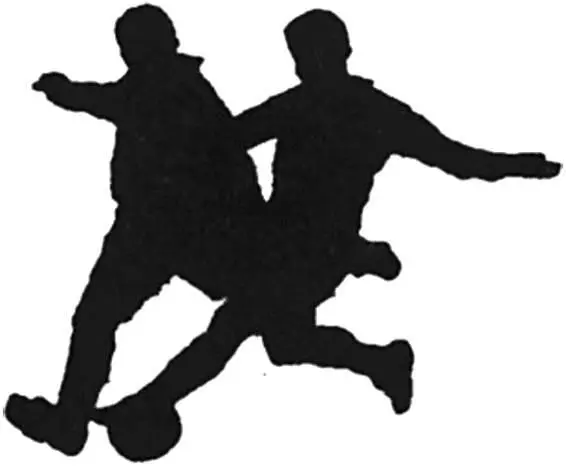
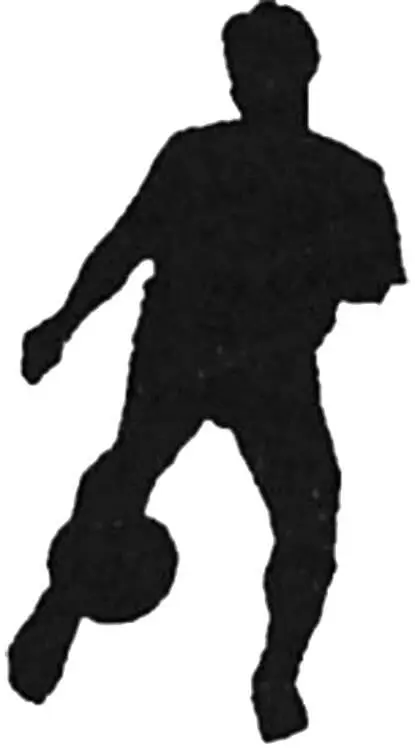
Here is the itinerary of a player from the southern reaches of the globe who has good legs and good luck. From his hometown he moves to a provincial city, then from the provincial city to a small club in the country’s capital. The small club has no choice but to sell him to a large one. The large club, suffocated by debt, sells him to an even larger club in a larger country. And the player crowns his career in Europe.
All along this chain, the clubs, contractors, and intermediaries end up with the lion’s share of the money. Each link confirms and perpetuates inequality among the parties, from the hopeless plight of neighborhood clubs in poor countries to the omnipotence of the corporations that run European leagues.
In Uruguay, for example, soccer is an export industry that scorns the domestic market. The continuous outflow of good players means mediocre professional leagues and ever fewer, ever less fervent fans. People desert the stadiums to watch foreign matches on television. When the World Cup comes around, our players come from the four corners of the earth, meet on the plane, play together for a short while, and bid each other good-bye, without ever having time to jell into a real team: eleven heads, twenty-two legs and a single heart.
Читать дальше
